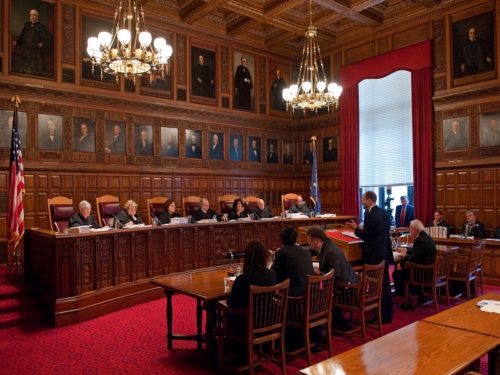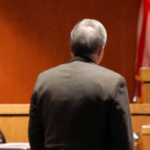How do I appeal a conviction?
If you were wrongfully convicted or unjustly sentenced, you can appeal your case to a higher court and seek a new trial or sentencing.

The Appeal Process – What You Need to Know
An appeal is a process where an attorney reviews the procedures which resulted in a conviction to see if any errors in the trial court might have denied the defendant a fair trial or otherwise resulted in an improper or illegal conviction or sentence. If you work with the appellate attorneys with LEWIS & DICKSTEIN, P.L.L.C. for your appeal, we will first order the transcripts of the lower court proceedings, including the trial, the plea hearing, and sentencing.
As soon as our appellate lawyers receive the transcripts, we will analyze them and the presentence report for evidence supporting the appeal. Our team will review all the facts and circumstances surrounding your arrest, conviction, and sentence, discuss the matter with you, and file papers in the appropriate appellate court outlining any errors during the trial court proceedings. If the lawyer in the trial court filed to provide effective assistance of counsel, their deficient performance might be sufficient to overturn a conviction or sentence. Appealing a conviction and sentence is a highly technical and time-consuming process with exacting and unforgiving rules and deadlines.
The Rule of the Michigan Court of Appeals
The Michigan Court of Appeals will not retry the facts of a case. It will not function as a jury to determine whether the defendant is guilty or if the witnesses were truthful. The Court of Appeals solely considers the process by which you were convicted and determines whether it was fair and followed the law. The Court of Appeals will review such matters as the admissibility of evidence, the correctness of jury instructions, the propriety of the trial judge’s rulings, and the sufficiency of a guilty plea or evidence at trial –to name a few. If no legal errors occurred during your trial or guilty plea, you may not have any reasons to appeal.
The appellate court will not reduce a sentence just because it is harsh. The defense must show that the trial judge committed a legal error when they imposed the sentence to obtain a resentencing. Sentencing errors might include improperly scoring the sentencing guidelines, considering acquitted charges, considering race or ethnicity, bias, failing to make a factual record regarding a deviation from the guidelines, and more.
Bond Pending the Appeal of a Conviction or Sentence
The defendant is not automatically entitled to bond and release while the appeal is pending in the appellate court. Most trial judges and the Court of Appeals will not grant bond pending appeal unless your case is exceptional. Once a judge decides to put you in jail or prison, it is unlikely that the appellate court will reverse that decision and grant a bond pending appeal. Although few lawyers will even attempt to seek bond pending appeal, the Defense Team with LEWIS & DICKSTEIN, P.L.L.C. explores every option to fight for the release of their clients.

No New Evidence in the Appellate Court
The Court of Appeals does not see witnesses or hear testimony. It relies on written records from the trial court, including transcripts and exhibits. With limited exceptions, the appellate court will not consider any claims of error that do not appear on the record – that is, facts you may claim are valid but were not produced or referenced in court. When necessary, there is a procedure for returning to the trial court, taking testimony, and making a record for appealing a conviction or sentence.
The Steps of a Criminal Appeal
The appellate process involves several steps. The first step is obtaining the transcripts, researching, and writing the appellate brief. This step can take several months to a year to complete, depending on whether you pled guilty or went to trial and the length of your transcripts. The appellant’s Brief on Appeal is due 56 days after the filing of the claim of appeal or the transcripts, whichever is later. It is often necessary to extend that time because many cases cannot be prepared within 56 days, especially when your Michigan appellate attorney must handle many cases simultaneously. The prosecutor has 35 days to file a Brief on Appeal replying to ours, but they can also extend their deadline.
After the defense and prosecution file their respective briefs, the Court of Appeals sets a date for oral arguments, assuming either side requests a hearing before the court. The Court of Appeals generally takes two to six months to decide an appeal of a conviction and sentence and issue an opinion. The delay of the decision can be shorter or longer depending on the Court of Appeal’s caseload. Once the appellant files their Brief on Appeal, the attorney has no control over the time it takes for the appeal to process through the Court of Appeals.
Odds of Winning an Appeal
The Appeal Team with LEWIS & DICKSTEIN, P.L.L.C. can assess the chances for success on an appeal when they receive the trial court transcripts and research and evaluate any potential claims of error. Except in a limited number of situations, the prosecution can retry a defendant if the Court of Appeals reverses their conviction. If a defendant is retried and reconvicted, they can only get a higher sentence if their prior record reflects misconduct occurring after the original sentencing hearing. For example, new convictions, prison escapes, or other serious misbehavior. Generally, a defendant cannot be retried on a higher charge, although some exceptions exist. These exceptions mainly involve guilty pleas where a plea bargain required dismissing other charges.

Why is LEWIS & DICKSTEIN, P.L.L.C. the best choice for your appeal?
The appellate attorneys with LEWIS & DICKSTEIN, P.L.L.C. have decades of experience successfully representing thousands of clients in criminal matters, including appeals. Call us right away to schedule a free consultation. We will take the time to discuss your case, answer your questions, and work with you to develop a winning strategy for appealing a wrongful conviction or improper sentence. We will find a way to help you, and are not afraid to win!
Call us today at (248) 263-6800 for a free consultation or complete an online Request for Assistance Form. We will contact you promptly and find a way to help you.











